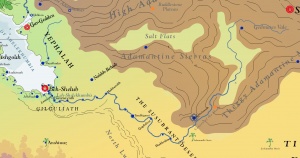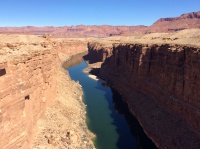Difference between revisions of "Leh-Shelekhumbis River"
Trismegistus (talk | contribs) m |
Trismegistus (talk | contribs) m |
||
| Line 17: | Line 17: | ||
*[[Shelekhumbia]] | *[[Shelekhumbia]] | ||
*[[Sultanate of Beph-Themesh]] | *[[Sultanate of Beph-Themesh]] | ||
| + | *[[Trans-Thybdis]] | ||
*[[Weshif]] | *[[Weshif]] | ||
Latest revision as of 16:26, 26 August 2024

The Leh-Shelekhumbis River is the great fluvial artery of the desert country of Shelekhumbia. The river carries the rainwater captured by the Adamantine Mountains and bears it through the Susurrant Desert to the sea. As with all great rivers, the Leh-Shelekhumbis was historically considered divine and ruled over by the male divinity, Shalakhmu whose name generates the name of the river and the ancient name of the country. The word 'leh' is thought to mean a water divinity in the ancient Shelekhumbi Language. The river is over 2900 ddwmir (1900 km or 1200 miles) in length from source to sea. The river is of central importance to the economy, way of life, and identity of the land of Shelekhumbia. As it brings water through the desert, it is honored as particularly precious.
The river passes through the evocative Canyon of the Shedu shortly before it descends from the Adamantine Mountains into the Susurrant Desert. The small settlement of Kishkelumadh, the site of an important Hamagnostic monastery, rests to the north of the river. Important sites along the river include Ori, Shakhrilim, Gegdolissi, Tandhigumi, Makhutolib, Elántuventh, and Lumajat.
The first inhabitants of the land are thought to have been the Shelekhumbi people. They were joined in ancient times by waves of migrations of the Thammazite Tribes.
The river and the cult of the river god, Shalakhmu, played a central role in the state religion of Ishmutekebessa Goddess-Queen of Leh-Shelekhumbis. The ruling House Tchula which is Imzaami does not officially sanction the worship of the river.

See Also
| This article is a stub. It requires further development by the creator. |
